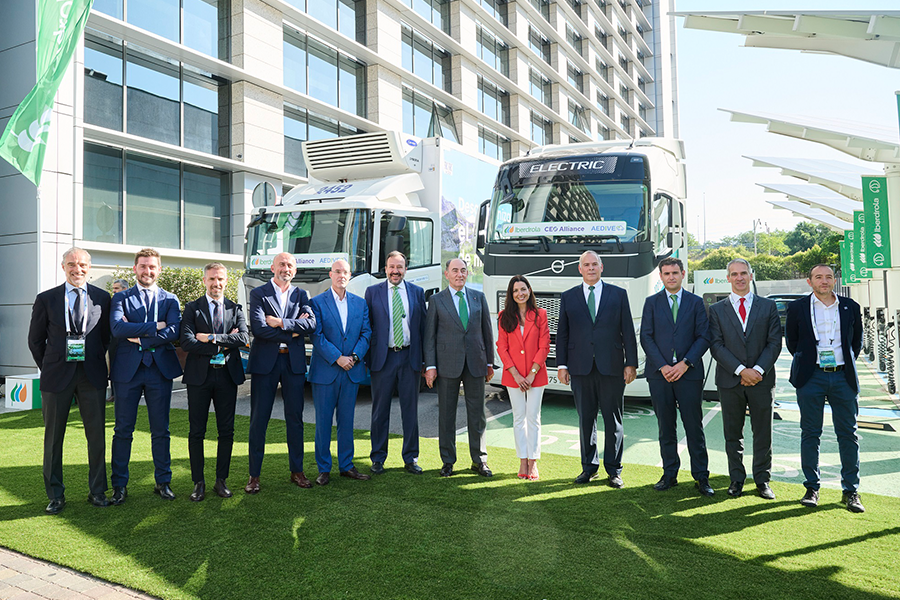Alliance formed with AEDIVE to electrify heavy goods transport in Spain
- The initiative aims to accelerate the electrification of trucks in order to reduce CO2 emissions and combat climate change.
- It is the first alliance bringing together all sectors involved in the electrification of heavy road transport.

Ignacio S. Galán, Executive Chairman of Iberdrola, Mario Ruiz-Tagle, CEO of Iberdrola Spain and Agustín Delgado, Director of Innovation and Sustainability of the Iberdrola Group, together with industry representatives.
IberdrolaEnlace externo, se abre en ventana nueva. and the Business Association for the Development and Promotion of Electric Mobility (AEDIVE) have signed an agreement to create an alliance for the electrification of heavy road transport in Spain. The initiative aims to accelerate the decarbonisation of heavy road transport and combat climate change. At the same time, it aims to improve fuel efficiency, limit high fuel consumption, and reduce the cost for logistics operators and the country.
Iberdrola and the CEO Alliance for Europe's Recovery, Reform and Resilience (CEO Alliance For Europe) have identified the need to join forces. This is a common place where all companies in the heavy freight value chain come together, identify bottlenecks and propose solutions to accelerate the electrification of road transport.
It is the first alliance that brings together all the sectors involved in the electrification of heavy road transport: manufacturers, charging infrastructure, logistics operators and end customers. The aim is to establish a strategic collaboration between its members and to position the Spanish industry as a driving force in electrification, more specifically in road freight transport.
The initiative also aims to develop a roadmap, making it a pioneer in Europe, and to serve as a lever to adapt and accelerate the regulation needed to achieve the decarbonisation targets.
The alliance was presented at an event at Iberdrola's offices in Madrid attended by more than 100 representatives of public administrations, sectoral organisations and companies linked to the entire value chain of the heavy goods transport sector.
"Driving an electric truckEnlace externo, se abre en ventana nueva. will be cheaper than a diesel truck in about five years. To accelerate this momentum, the EU has recently passed legislation on heavy road transport, which is a huge challenge for hauliers, logistics companies and energy companies. The Alliance that we are presenting today will help us all to jointly seek solutions that will enable the successful electrification of heavy transport in Spain, with benefits for the competitiveness of a key sector in the Spanish economy," said Agustín Delgado, Director of Innovation and Sustainability of the Iberdrola Group.
The director general of AEDIVE, Arturo Pérez de Lucia, pointed out that "this alliance, which will be managed in the Iberian market by AEDIVE, seeks to optimise the promotion of the entire industrial, technological and service value chain focused on electric mobilityEnlace externo, se abre en ventana nueva. in heavy goods transport and to accelerate progress towards the electrification of a key sector in road mobility".
European strategy
The alliance is in line with the European Union's fight against climate change Enlace externo, se abre en ventana nueva.and its goal for all member countries to reduce their greenhouse gas emissions by at least 55% by 2030.
In the European Union, heavy goods transport represents only 1% of the total vehicle fleet. However, it is responsible for 25% of greenhouse gas emissions and energy consumption in road transport.
Aware of the importance of decarbonisation in this sector, the European Union has set requirements for member states and manufacturers through the following regulations
- The Regulation on Alternative Fuels Infrastructure, which sets targets for member states for the installation of charging infrastructure for heavy duty vehicles in the EU in the coming years.
- The proposed revision of the CO2 emission standards regulation for truck which, if accepted includes a CO2 reduction target of 90% for new trucks in 2040.
